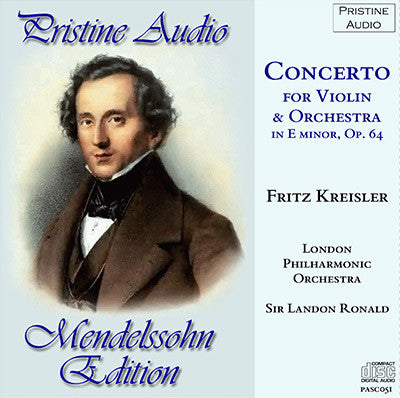
This album is included in the following sets:
This set contains the following albums:
- Producer's Note
- Full Track Listing
- Cover Art
Introduction: Felix Mendelssohn was born in Hamburg, Germany on 3rd February, 1809 into a distinguished and affluent family of bankers, intellectuals and artists. A child prodigy, he produced his first composition in 1820; a constant stream of work continued throughout his relatively short life - he died in Leipzig on 4th November, 1847 at the age of just 38. These notes, which accompany Pristine Audio's Mendelssohn Edition, released to mark the 160th anniversary of his oratorio Elijah, our first award-winning release for Divine Art, follow Mendelssohn's life through eight compositions newly remastered for August 2006.
By 1844 Mendelssohn was still highly unhappy with the arrangements in Berlin and his appointment at the Academy of the Arts, and by the end of November had negotiated a release from all official duties there bar occasional commissions from the King of Prussia as required - for this he took a salary of 1000 thaler a year.
One of the composer's final acts prior to a visit to Berlin was the completion in September of his Violin Concerto. The composer had spent a particularly happy summer with his wife and family in Frankfurt, and it was here that the concerto, which had been contemplating for six years, finally came to fruition.
Here we find a work which argues powerfully against any opinion that Mendelssohn's later years showed a steady decline. The last and certainly one of the best of his larger orchestral works, the Violin Concerto has proved a perennial favourite ever since. The banning of it by the Nazis in response to Mendelssohn's Jewish heritage forced them to seek out a suitable alternative but, as pleasant as it is, Schumann's Violin Concerto (PASC004) is no match for the real thing.
When working on the restoration of this quite fabulous 1935 recording by Kreisler I was frequently confused into thinking it was perhaps the Heifetz recording made in the late 1940's, and surprised at the poor reaction this had received from the critics. My mistake - the sound here is quite remarkable for its age, and the performance is, for me, unsurpassed.
MENDELSSOHN Violin Concerto in E minor, Op. 64
Fritz Kreisler, violin
London Philharmonic Orchestra
Conductor: Sir Landon Ronald
Recorded 8 April, 1935
Abbey Road Studio 1, London
Released as HMV DB.2460-2
Matrix Numbers: 2EA1465-70
Takes: 4A, 2A, 1, 2A, 1A, 4A
("A" indicates alternate disc cutter used)
Duration 25'30"
Bill Rosen's Review
That so perfect and spontaneous-seeming a work as the Mendelssohn Violin Concerto can have taken seven years to come to fruition and caused the composer real trauma, depression and uncertainty amazes us. He wrote it for and had the able assistance of Ferdinand David, the concertmaster of the Leipzig Gewandhaus Orchestra. Even in the final year of the concerto's gestation, Mendelssohn could write to David, “Do not laugh at me too much, I feel ashamed in any case, but I cannot help it; I am just groping around.” Mozart, I believe, once said that he sweat so that the audience does not sense it in the music. The concerto presents several structural innovations: No orchestral-alone exposition, the cadenza after the development, a highly integrated violin/orchestra texture and movements that are connected by orchestral tissue. I love the Mendelssohn concerto, but the insistent minorish tone of the first movement can give it a whiny, wimpish quality if not played with strength. Taking the movements fast and highlighting the solo violin can only worsen the effect.
Fritz Kreisler’s full, fat tone which combines sweetness with vigor fully avoids the problem. The strong backbone that lies behind the beautiful tone and the moderate tempi present a first movement that is masculine and glorious. The cadenza seems an integral part of the work. The second theme of the movement is played with tenderness that does not cloy. The orchestral accompaniment is alert and occasionally outstanding as in the third movement.
One misses the bassoon connection to the second movement, which is dry-eyed but tender. In the last movement the delightfully capricious opening theme is more beautifully integrated with the orchestra (particularly the flutes) than I have ever heard it before in this work. The final high violin note seems this once to be climactic instead of just frenetic.
The sound is very adequate, especially allowing Kreisler’s tone to seem so beautiful and making the concerto sound a worthy companion to the Brahms and Beethoven concerti.

